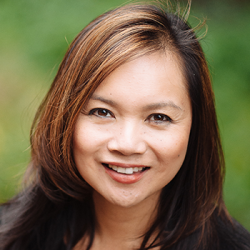
This year marks 30 years in public education for me as a teacher, PBL specialist, and instructional coach.
Three decades. Approximately 5,400 days. Needless to say, I'm celebrating a special milestone in my education career. This month I’m retiring from the classroom and school world (but not the field of education).
As I reflect on the last 30 years, I think of where it all started: my first year, my first class (pictured below). I look at myself, fresh out of college, eager, excited, and SO new, and I think, “What would I tell myself, knowing what I know now?”

Dear First-Year-Teacher Myla,
Congratulations on graduating from Michigan State University and getting your first job at Colony Meadows Elementary! Your first year will be one of the most memorable and challenging times in your teaching career. Enjoy it. Learn from it.
Each year will be a different adventure with new students, new parents, new colleagues, and an abundance of initiatives and expectations, but one thing will remain the same: You'll find that this calling to teach will push you to be an advocate for ALL students, a constant learner, and a leader for your community and your colleagues.
At times, it will be taxing and overwhelming; it will also be joyful and, above all, rewarding. There will be times when you want to give up. Don't. You can do it.
Here's some advice I’d offer to help you in your teaching career.
1. Show them the light in your eyes.
Toni Morrison, one of my favorite authors, wrote, "When a child walks in the room, your child or anybody else's child, do your eyes light up? That's what they're looking for." Do you get excited about your students entering your classroom? Building a good culture in your classroom begins with the relationships you create with your students. Make sure they know you care.
2. "Caring" doesn't mean lowering your expectations.
It means being THAT adult in their lives who tells them, "You can do this. It's not impossible." Regardless of ability, gender, race, culture, or socioeconomic background, hold the same high expectations for every student. If you believe they can do it, so will they.
As their teacher, you will need to scaffold the learning, help them, and gradually let them do it on their own. All this happens when you continually take time to listen, observe, and assess what your students need. That's what it means to have a learner-centered classroom: putting the learner first. These are just small steps to help build the culture you'll need for Project Based Learning—a teaching method I’d recommend!
3. Project Based Learning isn't easy, especially for a new teacher, but it’s definitely worth it.
Changing your instructional practice or redesigning curriculum can be challenging, especially if it's your first year and you don't even know what you're supposed to teach. The key in the beginning is to keep it simple. If that means you don't do a project in the first weeks, that’s okay. Establishing relationships and building a community with students are essential first steps.
Don’t think you have to design every project from scratch. It’s OK to adapt an existing project that a colleague or curriculum provider has already developed.
And don’t forget you can always call a friend: Is there another teacher in your school who can collaborate with you or your thought partner on project ideas? Do you have someone who can listen when you've had a tough day with your project? You. Are. Not. Alone.
4. Build relationships.
Remember to take time for yourself and your loved ones. Build relationships at school, home, work, wherever you can find joy. They will help you survive the tough moments and celebrate your successes. They are what you'll remember the most thirty years from now.
Finally, with all the challenges of your job, don't forget why you chose this profession, this calling.
For you, it's always been the students and making a difference, one child at a time.
Wishing you all the best on your journey,
Myla 2019 (experienced, but never old)

